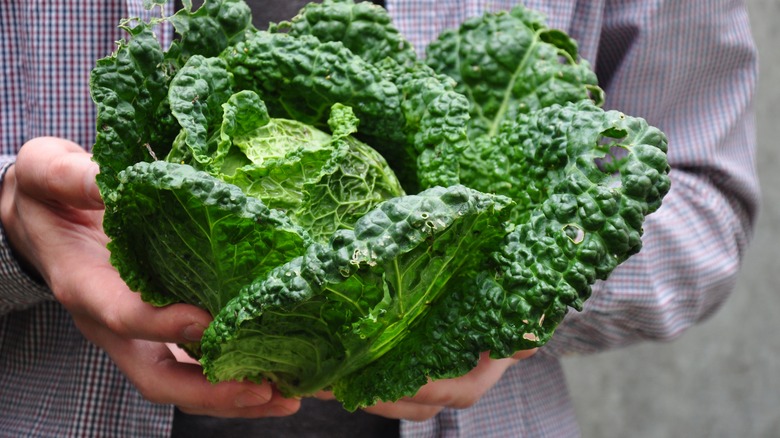The Debated Origin Of The Savoy Cabbage's Name
Cabbage is an incredibly versatile ingredient in dishes all around the world, from coleslaw and classic corned beef and cabbage to Southern fried cabbage and cabbage soup. There are several varieties of the vegetable, including the well-known green and red cabbage, napa cabbage, bok choy, and even Brussels sprouts.
Another member of the family is the Savoy cabbage, which is often considered the shining star of cabbage varieties. The innermost leaves have a texture that's crispy enough to serve raw, as a substitute for green or red cabbage in salads, yet the outermost leaves are delicate enough to incorporate into cooked dishes, according to The Spruce Eats.
Like a common green cabbage, a Savoy cabbage is green, round, and densely packed with leaves of diverse shape and structure. The leaves are described as having a flexible feel and a sweeter taste than most cabbages.
The name of the cabbage, however, is up for debate, according to multiple sources.
Where did the Savoy cabbage's name originate?
According to both Specialty Produce and Lowly Food, the winter vegetable was first grown in European countries and the first known record of the cabbage is dated around the 16th century, give or take. They claim the name originates from the territory of an Italian royal family, the House of Savoy, which was most prominent during the 1300s.
Contradicting accounts of the cabbage's history comes from The Spruce Eats and Cook's Info, who say that the cabbage isn't named for the House of Savoy, but for the Savoy region in France, which is in the Western Alps. Cook's Info continues on to point out that Savoy, France, was actually ruled by the Italian House of Savoy, which indicates that the truth could lie somewhere between the conflicting theories.
While the origins of the Savoy cabbage remain somewhat unclear, the vegetable's versatility as an ingredient is evident. The next time you cook a delicious pasta dish or a steaming pot of vegetable stew, consider throwing in a few leaves — it'll taste good, even if you don't know exactly where it came from.

